-
 Bitcoin
Bitcoin $80,573.2637
-2.11% -
 Ethereum
Ethereum $1,543.7425
-5.87% -
 Tether USDt
Tether USDt $0.9993
-0.03% -
 XRP
XRP $1.9998
-1.09% -
 BNB
BNB $579.4823
0.04% -
 USDC
USDC $0.9999
-0.01% -
 Solana
Solana $115.2563
-1.78% -
 Dogecoin
Dogecoin $0.1571
-0.49% -
 TRON
TRON $0.2360
-1.34% -
 Cardano
Cardano $0.6242
0.20% -
 UNUS SED LEO
UNUS SED LEO $9.4144
0.31% -
 Chainlink
Chainlink $12.4218
-0.15% -
 Avalanche
Avalanche $18.6206
1.95% -
 Toncoin
Toncoin $2.9432
-4.54% -
 Hedera
Hedera $0.1720
1.79% -
 Stellar
Stellar $0.2332
-1.86% -
 Sui
Sui $2.1599
-1.75% -
 Shiba Inu
Shiba Inu $0.0...01190
0.51% -
 MANTRA
MANTRA $6.4630
-5.02% -
 Bitcoin Cash
Bitcoin Cash $295.6172
-1.59% -
 Litecoin
Litecoin $75.0786
-0.21% -
 Polkadot
Polkadot $3.5329
-1.57% -
 Dai
Dai $0.9997
-0.03% -
 Bitget Token
Bitget Token $4.2415
-2.14% -
 Ethena USDe
Ethena USDe $0.9985
-0.04% -
 Hyperliquid
Hyperliquid $14.6899
5.78% -
 Pi
Pi $0.5955
0.25% -
 Monero
Monero $202.1118
-0.81% -
 Uniswap
Uniswap $5.1340
-3.26% -
 OKB
OKB $53.6888
0.48%
What is decentralized finance (DeFi)? How does it subvert traditional banking?
DeFi leverages blockchain to offer financial services without banks, aiming to democratize finance and challenge traditional banking systems.
Apr 05, 2025 at 04:56 am
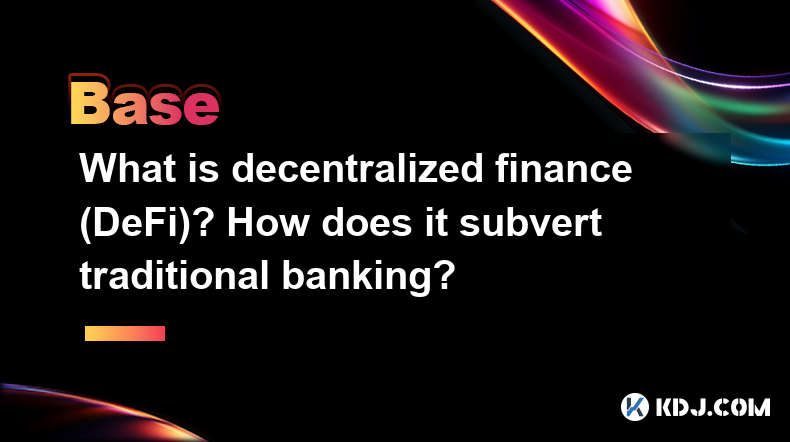
Decentralized Finance, commonly known as DeFi, represents a groundbreaking shift in the financial sector by leveraging blockchain technology to create a financial ecosystem that operates without traditional intermediaries such as banks. At its core, DeFi aims to democratize finance by making financial services accessible to anyone with an internet connection, thereby challenging the centralized nature of traditional banking systems.
The Foundations of DeFi
DeFi is built on blockchain technology, most notably Ethereum, which allows for the creation of smart contracts. Smart contracts are self-executing contracts with the terms of the agreement directly written into code. They automatically enforce and execute the terms of a contract when predefined conditions are met, eliminating the need for intermediaries. This foundational technology enables the creation of decentralized applications (dApps) that offer various financial services, from lending and borrowing to trading and asset management.
How DeFi Subverts Traditional Banking
Traditional banking relies heavily on centralized institutions that control and manage financial transactions. In contrast, DeFi subverts this model by enabling peer-to-peer financial interactions. Here are some key ways in which DeFi challenges traditional banking:
Accessibility: DeFi platforms are accessible to anyone with an internet connection, regardless of their location or financial status. This contrasts with traditional banks, which often have stringent requirements for opening accounts and accessing services.
Transparency: All transactions on DeFi platforms are recorded on the blockchain, making them transparent and verifiable by anyone. Traditional banking systems, on the other hand, often lack transparency, with transactions processed behind closed doors.
Control and Ownership: In DeFi, users have full control over their assets. They can manage their funds directly without needing to trust a third party. Traditional banking requires users to deposit their money into the bank, relinquishing control over their assets to the institution.
Speed and Efficiency: DeFi transactions are typically faster and more efficient than those in traditional banking. Blockchain technology enables near-instantaneous transactions, whereas traditional banking can involve delays due to processing times and intermediary involvement.
Lower Costs: DeFi platforms often have lower fees compared to traditional banking services. By eliminating intermediaries, DeFi reduces the costs associated with financial transactions.
Key Components of DeFi
To understand how DeFi operates, it's essential to explore its key components:
Decentralized Exchanges (DEXs): These platforms allow users to trade cryptocurrencies directly with one another without the need for a centralized intermediary. Examples include Uniswap and SushiSwap.
Lending and Borrowing Platforms: DeFi lending platforms like Aave and Compound enable users to lend their cryptocurrencies to others and earn interest, or borrow assets by providing collateral.
Stablecoins: These are cryptocurrencies designed to minimize volatility by pegging their value to a stable asset, such as the US dollar. Stablecoins like DAI are integral to DeFi, providing a reliable medium of exchange and store of value.
Yield Farming and Liquidity Mining: These practices involve users providing liquidity to DeFi platforms in exchange for rewards, often in the form of additional tokens. This incentivizes participation and helps maintain the liquidity of the ecosystem.
Decentralized Insurance: Platforms like Nexus Mutual offer insurance products that are managed through smart contracts, providing coverage for various risks within the DeFi space.
The Role of Governance in DeFi
Governance is a critical aspect of DeFi, as it determines how platforms are managed and updated. Many DeFi projects use decentralized autonomous organizations (DAOs) to facilitate community-driven decision-making. In a DAO, token holders can vote on proposals that affect the platform's development and operations. This contrasts with traditional banking, where decisions are made by a centralized board or management team.
Challenges and Risks in DeFi
While DeFi offers numerous benefits, it also comes with its own set of challenges and risks:
Security: Smart contracts are only as secure as the code they are written in. Vulnerabilities in smart contracts can lead to hacks and significant financial losses. Users must be vigilant and conduct thorough research before interacting with DeFi platforms.
Regulatory Uncertainty: The regulatory landscape for DeFi is still evolving. Governments and financial regulators are grappling with how to classify and regulate these new financial instruments, which can create uncertainty for users and developers.
Scalability: As DeFi platforms grow in popularity, they face challenges related to scalability. High transaction volumes can lead to network congestion and increased fees, which can hinder the user experience.
User Experience: DeFi platforms can be complex and intimidating for newcomers. Improving the user experience and making DeFi more accessible to the average user is an ongoing challenge for the industry.
Practical Example: Using a DeFi Lending Platform
To illustrate how DeFi works in practice, let's walk through the process of using a DeFi lending platform like Aave:
Connect Your Wallet: Start by connecting your Ethereum wallet (such as MetaMask) to the Aave platform. This allows you to interact with the platform and manage your assets.
Deposit Assets: Choose the cryptocurrency you want to deposit into the platform. For example, you might deposit ETH to earn interest. Click on the "Deposit" button, enter the amount, and confirm the transaction.
Earn Interest: Once your assets are deposited, they start earning interest automatically. You can monitor your earnings on the platform's dashboard.
Borrow Assets: If you want to borrow assets, you can use your deposited assets as collateral. Navigate to the "Borrow" section, select the asset you want to borrow, and enter the amount. The platform will calculate the required collateral based on the loan-to-value (LTV) ratio.
Repay Loans: When you're ready to repay your loan, go to the "Repay" section, select the asset you borrowed, and enter the amount you want to repay. Confirm the transaction to complete the repayment.
Withdraw Assets: To withdraw your deposited assets, go to the "Withdraw" section, select the asset, and enter the amount. Confirm the transaction to transfer the assets back to your wallet.
Frequently Asked Questions
Q: How does DeFi ensure the security of user funds?
A: DeFi platforms use blockchain technology and smart contracts to secure user funds. However, the security of these platforms depends on the robustness of the smart contract code. Users should always conduct due diligence and use reputable platforms to minimize risks.
Q: Can I use DeFi if I don't have any cryptocurrency?
A: To participate in DeFi, you typically need to have some cryptocurrency. However, you can acquire cryptocurrency through centralized exchanges or by using services that allow you to buy crypto with fiat currency.
Q: What happens if a DeFi platform fails or goes bankrupt?
A: In the event of a DeFi platform failure or bankruptcy, the outcome depends on the platform's structure and the nature of the failure. If the platform is decentralized and assets are held in smart contracts, users may be able to withdraw their funds directly. However, if the platform is centralized or if there are vulnerabilities in the smart contracts, users could face losses.
Q: How can I stay updated on the latest developments in DeFi?
A: To stay updated on DeFi, you can follow reputable sources such as DeFi Pulse, The Defiant, and CoinDesk. Joining DeFi communities on platforms like Discord and Telegram can also provide valuable insights and updates from the community.
Disclaimer:info@kdj.com
The information provided is not trading advice. kdj.com does not assume any responsibility for any investments made based on the information provided in this article. Cryptocurrencies are highly volatile and it is highly recommended that you invest with caution after thorough research!
If you believe that the content used on this website infringes your copyright, please contact us immediately (info@kdj.com) and we will delete it promptly.
- Fluidkey, a privacy-focused project, is tackling one of the most discussed about concerns about transaction transparency on Ethereum Virtual Machines (EVM) chains
- 2025-04-11 11:05:12
- New Ukrainian commemorative coin "National Guard of Ukraine" put into circulation
- 2025-04-11 11:05:12
- Last Thursday, US-based asset manager Canary Capital filed an application with the Securities and Exchange Commission (SEC)
- 2025-04-11 11:00:12
- Last Thursday, US-based asset manager Canary Capital filed an application with the Securities and Exchange Commission (SEC)
- 2025-04-11 11:00:12
- An interview with MANTRA CEO John Patrick Mullin
- 2025-04-11 10:55:13
- Council bosses explain why Bramley-Moore Dock parking restrictions have been suspended
- 2025-04-11 10:55:13
Related knowledge
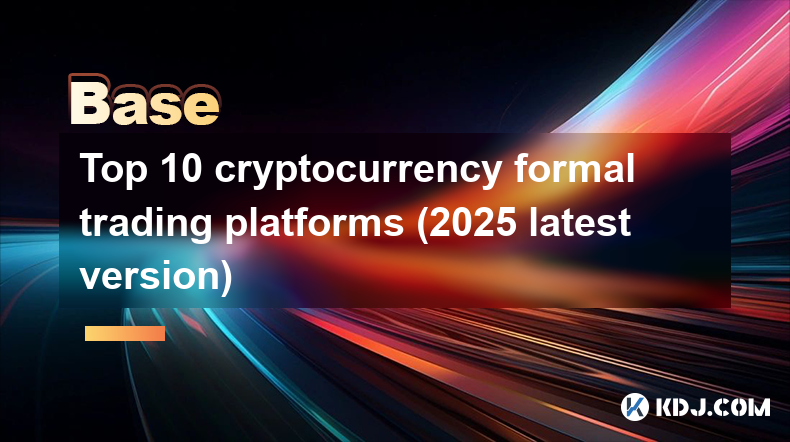
Top 10 cryptocurrency formal trading platforms (2025 latest version)
Apr 11,2025 at 03:14am
Looking ahead to 2025, the cryptocurrency market is becoming increasingly mature, and compliant operations have become the core focus of trading platforms. Choosing a formal, safe and transparent exchange is the key to investors protecting their own rights and interests and participating in the market steadily. This article will predict the top ten cryp...
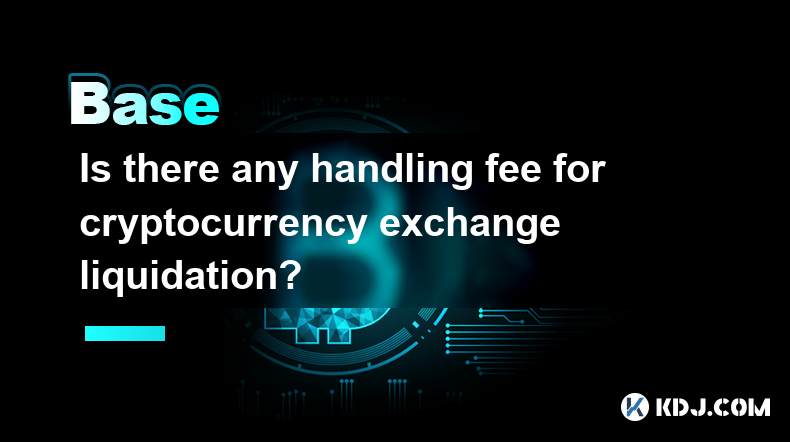
Is there any handling fee for cryptocurrency exchange liquidation?
Apr 10,2025 at 04:29pm
When trading contracts on cryptocurrency exchanges, liquidation is a word that scares investors. A liquidation means that the investor has lost all its principal. So, will the exchange still charge a handling fee when the liquidation is liquidated? This is a concern for many investors. This article will give a detailed answer to this. Important statemen...
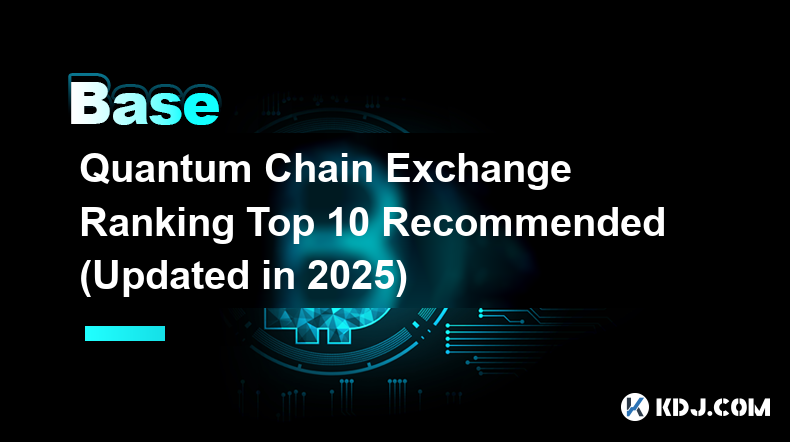
Quantum Chain Exchange Ranking Top 10 Recommended (Updated in 2025)
Apr 11,2025 at 12:14am
1. Binance:As one of the world's leading cryptocurrency trading platforms, Binance is known for its huge trading volume and rich currency options. It supports quantum chain trading and enjoys a high reputation worldwide. The security and compliance of the platform are also highly recognized. 2. Sesame Open Door (Gate.io):This is a large cryptocurren...
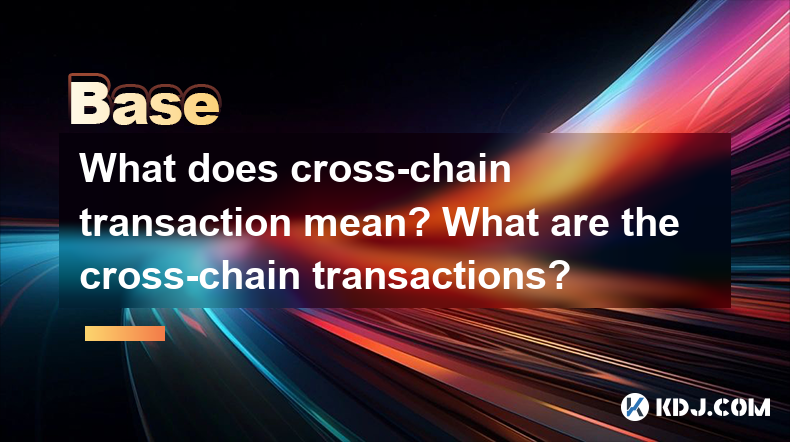
What does cross-chain transaction mean? What are the cross-chain transactions?
Apr 11,2025 at 09:08am
Here are some exchanges that support cross-chain transactions: Binance Exchange: In the first quarter of 2025, through the 'zero knowledge verification cross-chain bridge' and multi-chain privacy pool technology, the number of users exceeded 1.8 million, and the transaction volume increased by 210% month-on-month, ranking among the top five decentralize...
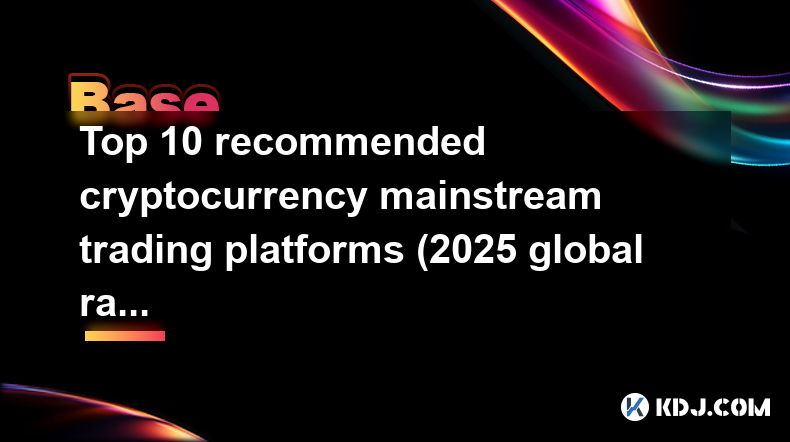
Top 10 recommended cryptocurrency mainstream trading platforms (2025 global rankings)
Apr 11,2025 at 03:57am
1. OKX Core advantages: It ranks among the top three in global trading volume, providing 620 trading pairs (including emerging currencies) and derivative trading (contracts/options); Passed SOC 2 certification, adopting cold storage and SAFU insurance fund mechanisms, and managed user assets exceed US$17 billion; Take a leading position in the Asian mar...
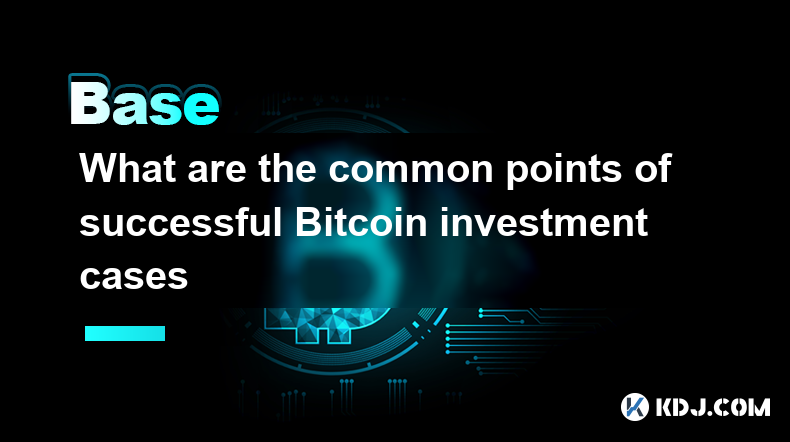
What are the common points of successful Bitcoin investment cases
Apr 11,2025 at 10:43am
Successful cases of Bitcoin investment usually have the following key characteristics: Early intervention: In the early days when Bitcoin prices were extremely low, such as around 2010, a Bitcoin may be less than $1. Those who start investing at this stage enjoy huge room for price growth. For example, Laslow Hanyez bought two pizzas with 10,000 bitcoin...

Top 10 cryptocurrency formal trading platforms (2025 latest version)
Apr 11,2025 at 03:14am
Looking ahead to 2025, the cryptocurrency market is becoming increasingly mature, and compliant operations have become the core focus of trading platforms. Choosing a formal, safe and transparent exchange is the key to investors protecting their own rights and interests and participating in the market steadily. This article will predict the top ten cryp...

Is there any handling fee for cryptocurrency exchange liquidation?
Apr 10,2025 at 04:29pm
When trading contracts on cryptocurrency exchanges, liquidation is a word that scares investors. A liquidation means that the investor has lost all its principal. So, will the exchange still charge a handling fee when the liquidation is liquidated? This is a concern for many investors. This article will give a detailed answer to this. Important statemen...

Quantum Chain Exchange Ranking Top 10 Recommended (Updated in 2025)
Apr 11,2025 at 12:14am
1. Binance:As one of the world's leading cryptocurrency trading platforms, Binance is known for its huge trading volume and rich currency options. It supports quantum chain trading and enjoys a high reputation worldwide. The security and compliance of the platform are also highly recognized. 2. Sesame Open Door (Gate.io):This is a large cryptocurren...

What does cross-chain transaction mean? What are the cross-chain transactions?
Apr 11,2025 at 09:08am
Here are some exchanges that support cross-chain transactions: Binance Exchange: In the first quarter of 2025, through the 'zero knowledge verification cross-chain bridge' and multi-chain privacy pool technology, the number of users exceeded 1.8 million, and the transaction volume increased by 210% month-on-month, ranking among the top five decentralize...

Top 10 recommended cryptocurrency mainstream trading platforms (2025 global rankings)
Apr 11,2025 at 03:57am
1. OKX Core advantages: It ranks among the top three in global trading volume, providing 620 trading pairs (including emerging currencies) and derivative trading (contracts/options); Passed SOC 2 certification, adopting cold storage and SAFU insurance fund mechanisms, and managed user assets exceed US$17 billion; Take a leading position in the Asian mar...

What are the common points of successful Bitcoin investment cases
Apr 11,2025 at 10:43am
Successful cases of Bitcoin investment usually have the following key characteristics: Early intervention: In the early days when Bitcoin prices were extremely low, such as around 2010, a Bitcoin may be less than $1. Those who start investing at this stage enjoy huge room for price growth. For example, Laslow Hanyez bought two pizzas with 10,000 bitcoin...
See all articles




















![🐢Super Mario World Koopa Troopa 100% 96⭐️ + Coin [Ao Vivo] 🐢Super Mario World Koopa Troopa 100% 96⭐️ + Coin [Ao Vivo]](/uploads/2025/04/10/cryptocurrencies-news/videos/super-mario-koopa-troopa-coin-ao-vivo/image-1.webp)


































































